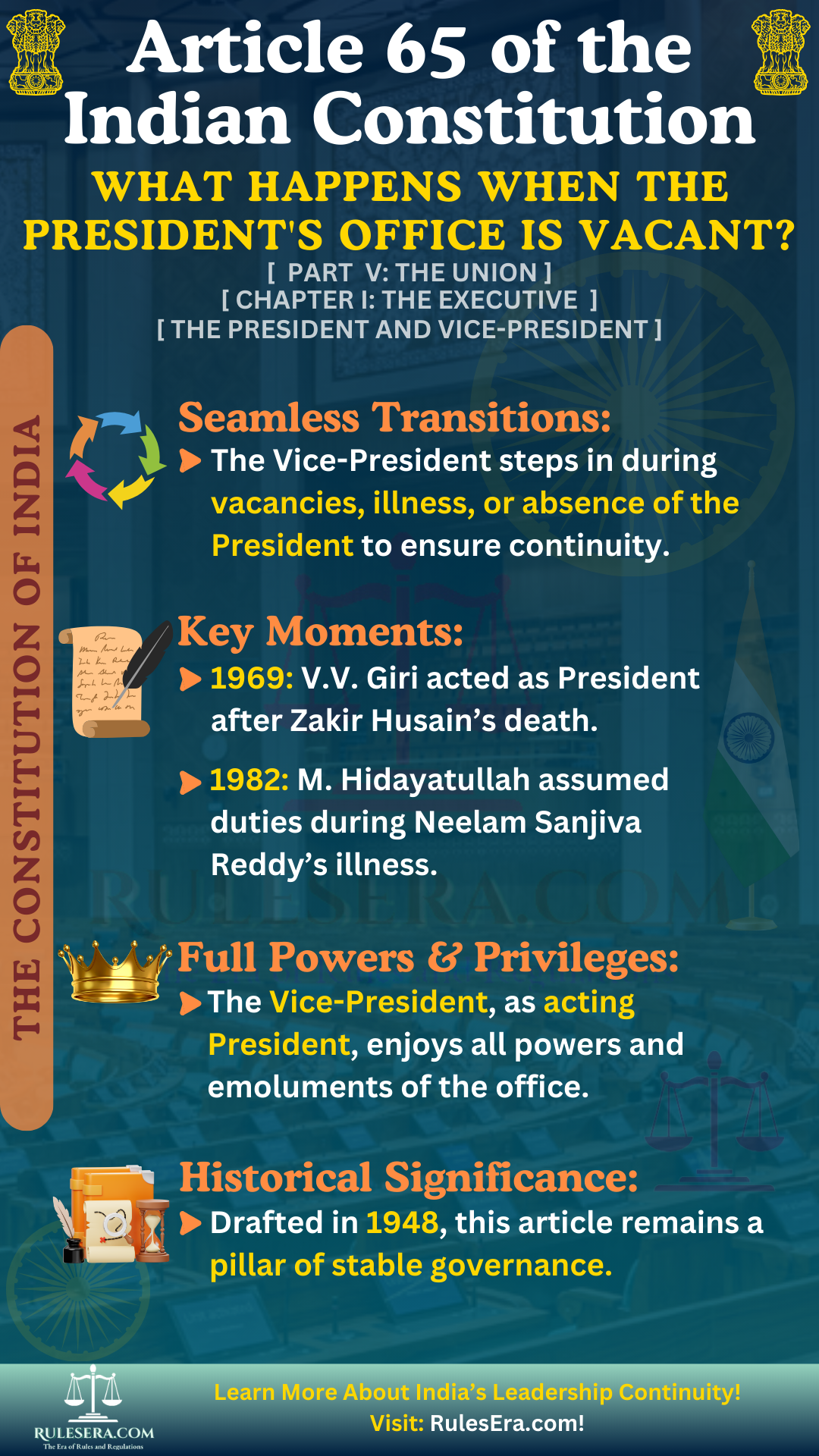Part V: The Union
Chapter I: The Executive
Article 65: The Vice-President to Act as President or to Discharge His Functions During Casual Vacancies or Absence of the President

--- Original Article ---
(1) Acting as President in Case of Vacancy: In the event of a vacancy in the President’s office due to death, resignation, removal, or other reasons, the Vice-President acts as the President until a new President is elected. This ensures there is no vacuum in the executive office, allowing critical decisions to continue without delay. The election must follow the process outlined in Chapter I, Part V of the Constitution.
(2) Discharge of Functions in Case of President’s Inability: If the President is temporarily unable to discharge his functions due to absence, illness, or any other cause, the Vice-President steps in to fulfill the President’s duties. This provision ensures continuity of governance during such periods.
(3) Powers and Privileges of Acting President: When acting as or discharging the functions of the President, the Vice-President assumes all powers, immunities, and privileges of the office. Emoluments, allowances, and privileges are either determined by Parliament or specified in the Second Schedule in the absence of specific legislation.
Amendments and Historical Significance
This Article has not been significantly amended since its inception in 1950. Its historical importance lies in its role in maintaining the smooth operation of the executive branch. Notable instances include:
- 1969: Vice-President V.V. Giri acted as President following the death of President Zakir Husain.
- 1982: Vice-President M. Hidayatullah acted as President due to the illness of President Neelam Sanjiva Reddy.
Real-Life Examples
- 1969: Vice-President V.V. Giri served as acting President after President Zakir Husain's death, until he was elected President later that year.
- 1982: Vice-President M. Hidayatullah acted as President when President Reddy was undergoing medical treatment.
References
- Constitution of India, Part V, Chapter I
- Second Schedule of the Constitution
Legislative History
Originally formulated as Article 54 during drafting on December 28, 1948, Article 65 was later incorporated in its current form.
Debates and Deliberations
Noteworthy deliberations during this process include:
- Mr. Naziruddin Ahmad: proposed replacing "date on which" with "time when" in Clause (1), to avoid any leadership vacuum. This amendment was rejected by the Assembly.
- Dr. B. R. Ambedkar: amended Clause (3) to ensure the Vice-President receives the same privileges and emoluments as the President, which was accepted.
- Pandit Thakur Das Bhargava: proposed an amendment regarding the responsibilities and privileges of the acting President, which was deemed redundant and thus rejected.
These discussions highlight the Constituent Assembly's focus on smooth transitions and clarity in governance during presidential vacancies, leading to the well-structured provisions of Article 65.
Frequently Asked Questions (FAQs):
When the Vice-President acts as the President, they assume all powers, immunities, and privileges of the President, including salary and allowances specified in the Second Schedule.
Yes, notable instances include Vice-President V.V. Giri acting as President in 1969 after the death of President Zakir Husain, and Vice-President M. Hidayatullah acting as President in 1982 due to the illness of President Neelam Sanjiva Reddy.